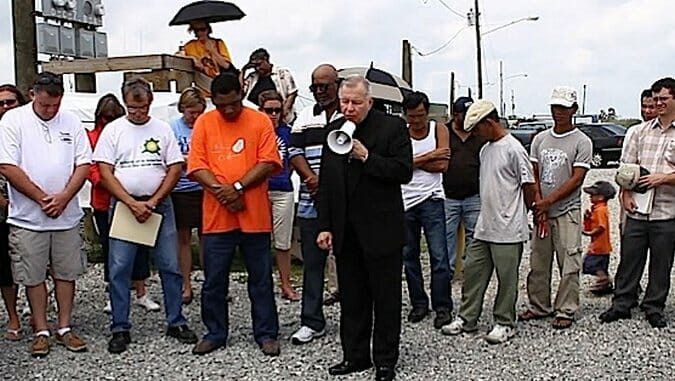
The importance of a film like Vanishing Pearls is immeasurable. In 2014, when racism and classism are alive, well, and often sanctioned by the American government, Nailah Jefferson’s first documentary deserves a spot alongside works like Ken and Sarah Burns’s The Central Park Five and Spike Lee’s When the Levees Broke. Another film concerned with giving voice to a voiceless community that was forgotten when tragedy struck, Vanishing Pearls introduces audiences to a historical, once-independent Louisiana fishing town. This community was not only destroyed by the massive BP oil spill, but its residents were further disenfranchised when the U.S. government got involved.
Jefferson begins her investigation with a look back at the initial response to the BP oil spill from scientists, politicians and BP officials themselves. A national investigation showed that the problems did not begin with the spill itself, but with the very presence of all of the oil rigs in the Gulf of Mexico. Similar to the events leading up to Hurricane Katrina, proper steps had not been taken to avoid or prepare for such a disaster. Vanishing Pearls shows that this lack of preparation was not merely an oversight; it was intentional, a way of doing things cheaply without regard for the lives at stake. As one specialist explained, BP and the agencies who stood with them after the spill were interested in privatizing the profit, while socializing the risk. In terms of the oil rigs, if all went well only BP and their stockholders stood to make huge gains, but if things went badly—like, massive oil spill destroying entire fishing communities and have lasting negative repercussions on sea life—only the individuals and the animals that provided them with their very livelihood would be affected.
Jefferson hones in on one particular group of fisherman, aptly narrowing the lens of her film. The oyster community of Pointe à la Hache, La., has a rich history in African-American oystermen. These men and their forefathers spent decades fighting a racist Louisiana government and made great strides, moving from a sharecropping-type work experience to an independent and successful network of fisherman.
Vanishing Pearls often plays like a real-life Erin Brockovich tale. The villains are big corporations responsible for polluted waters and million dollar lawyers (in this case, Kenneth Feinberg) seemingly on the side of everyone but the victims. So-called experts like Wes Tunnell (who admits to mistakes in a report used to downplay the severity of the spill) are also scrutinized. And those scientists who were not in the pocket of the government and the GCCF (Gulf Coast Claims Facility) are the heroes, and they show that the very chemicals used to cleanse the Gulf after the toxic spill had negatively affected the oyster reproduction. A dispersant had been illegally used for a quickie clean-up of sorts, which not only had devastating effects on the oysters, but further crippled the workers and families on the bayou.
There is no way around it—this is a heartbreaking, even infuriating film to experience. Jefferson uses scientific and personal testimony to tell this story, and we get to know the affected families well, along with the men fighting for justice—like Byron Encalade, president of the Louisiana Oysterman Association. This makes it even more painful to watch as many are quite literally starved out and forced to accept minuscule settlements, forever freeing BP from any liability.
On the one hand, there is real bias in Jefferson’s work. It’s no secret whose side she’s on, but, Vanishing Pearls is not merely a documentary about the after-effects of the BP catastrophe. It takes special concern for the individual men and the emotional and financial blows they took when they were no longer able to provide for their families. Some even turn to prescription meds, and there’s this subtle (but powerful) intimation that such disasters are not only profitable to the lawyers who come in and manage aid, but also the pharmaceutical industry. Although Jefferson tries to keep her scope narrow, there is still a lot of ground to cover in a story that spans three years and she carefully manages this wealth of material. While there is no Erin Brockovich-type happy ending, where the families affected receive millions for their pain and suffering, the film itself is a triumph, finally giving voice to the men and women of Pointe à la Hache.
Shannon M. Houston is a New York-based freelance writer, regular contributor to Paste, and occasional contributor to the human race via little squishy babies. You can follow her on Twitter.
Director: Nailah Jefferson
Writer: Nailah Jefferson
Starring: Byron Encalade, Wes Tunnell, Kenneth Feinberg
Release Date: Apr. 20, 2014